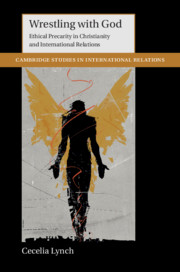Crossref Citations
This Book has been
cited by the following publications. This list is generated based on data provided by Crossref.
Omer, Atalia
2021.
Religion and the Study of Peace: Practice without Reflection.
Religions,
Vol. 12,
Issue. 12,
p.
1069.
DuBois, Heather M.
2021.
THE INTENSIFYING INTERSECTION OF ETHICS, RELIGION, THEOLOGY, AND PEACE STUDIES.
Journal of Religious Ethics,
Vol. 49,
Issue. 1,
p.
189.
2022.
Uncertainty and Its Discontents.
p.
365.
Agensky, Jonathan C
2024.
Religion, Refugees, and International Order: A Global History of Solidarity, Dislocation, and Reintegration in South Sudan.
Global Studies Quarterly,
Vol. 4,
Issue. 4,
Mašek, Vojtěch
2024.
The Art of the (Im)possible: Ethical Limits and Christian “Kenotic” Inspirations for Diplomacy.
The Review of Faith & International Affairs,
Vol. 22,
Issue. 3,
p.
80.
Ampofo, Akosua Adomako
2024.
Who Gives to Whom? Reframing Africa in the Humanitarian Imaginary.
p.
239.
Hartnett, Liane
2024.
How love orders: an engagement with disciplinary International Relations.
European Journal of International Relations,
Vol. 30,
Issue. 1,
p.
203.
Minnella, Carlotta
Pathak, Swapna
and
Scauso, Marcos Sebastian
2024.
The Tension within Norms: Agency and Risks in Pursuit of Global Climate Justice.
Global Studies Quarterly,
Vol. 4,
Issue. 2,
Lynch, Cecelia
2024.
Who Gives to Whom? Reframing Africa in the Humanitarian Imaginary.
p.
221.



